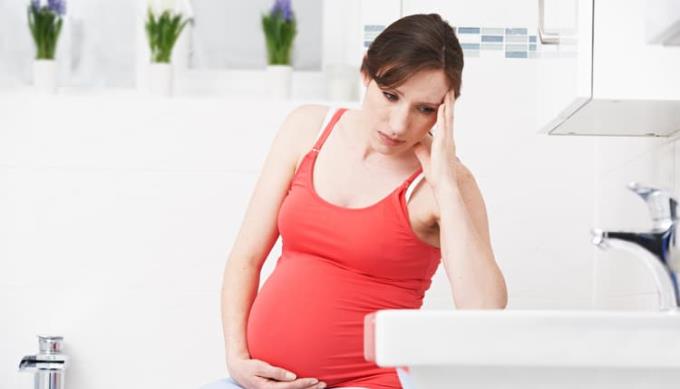It is quite normal for the stool to have mucus during pregnancy. However, if this is accompanied by abdominal pain or blood in the stool, you should seek immediate medical attention.
Pregnancy is a time when a woman's body has a lot of noticeable changes. Most people share with you the great things about being a mother, but with the happiness that comes with it, there are always difficult problems that you need to go through.
One of the things that makes pregnant women feel uneasy and worried is that the stool has mucus. So what is this situation like and is it dangerous for the baby in the womb? Please join aFamilyToday Health to continue to see the following sharing to get some more useful information.
How is stool considered normal?
In general, the shape and color of the stool during pregnancy should be no different from when you are not pregnant. If you notice these changes, it could be due to hormonal fluctuations and changes in diet during pregnancy.
The color of the stool usually ranges from light yellow to dark brown or black. Dark green stools during pregnancy are also considered normal unless it is accompanied by other symptoms.
Is stool with mucus normal during pregnancy?
Mucus stools are quite common and are common during pregnancy. It is often caused by changes that you experience during pregnancy. If your stool has only a little bit of mucus, there's no need to worry. However, if the mucus is accompanied by blood or you experience pain in your lower abdomen, see your doctor right away as this could be a sign that you have a health problem.
What causes stools or mucus during pregnancy?
Digestive problems are the main culprits that make mothers vote with mucus-filled stools. In addition to this cause, there are a number of other reasons to mention such as:
Hormone imbalances in the body.
Caused by the medications you took before becoming pregnant. If these medications contain a lot of iron or calcium, they can cause your stools to contain mucus.
As the uterus enlarges and puts pressure on the intestines, this leads to the secretion of mucus in the body.
If you have a food allergy, such as an allergy to nuts or milk, you may also have a stool with mucus.
Irritable bowel syndrome (IBS) with typical symptoms such as diarrhea and constipation can also cause the stool to appear mucus.
Colitis: this can cause bleeding, pus and mucus in the stool. It also often causes diarrhea, abdominal pain and cramps.
Food poisoning: If you have flu-like symptoms and your stools have blood or mucus, it is more likely that you could have food poisoning.
Bacterial or parasitic infections, such as dysentery, can also cause this problem.

What should be done when you notice mucus in the stool?
When you see mucus in your stools during pregnancy, try to figure out why. If the cause is infection or dehydration, your doctor may prescribe antibiotics for you. There are also some things you can try:
Change which vitamin supplements you are taking.
Ask your doctor about using stool softeners during pregnancy.
If you have an infection, take the correct dose of the antibiotic your doctor has prescribed and don't stop in the middle.
The secret to helping prevent stools with mucus
Here are some ways to help pregnant women prevent bowel movements with mucus:
1. Drink enough water
Mucus stools can be caused by dehydration. To avoid this, try to drink the recommended amount of water each day.
Exercise
Regular exercise before and during pregnancy can help boost the body's immune system. A healthy immune system will help the body fight harmful bacteria and viruses, thereby reducing the risk of disease.
However, before you try any of these exercises, consult your doctor to make sure they are safe for you and your baby in the womb. Every day, you should practice about 45 minutes, if you feel tired, take a short rest before doing it again.
3. Maintain a balanced diet
Constipation is a common cause of a pregnant woman's stool or mucus. To prevent this, you should maintain a balanced, nutritious diet to ensure you get all the minerals and vitamins your body needs. In addition, you should also eat a lot of green vegetables and fruits to supplement fiber for the body and prevent constipation.
4. Calm down
There are many causes of mucus in stools, but you don't have to be too stressed. In fact, stress made things much worse. Specifically, excessive stress makes you more likely to experience lower abdominal pain, bleeding and lead to premature delivery . To relieve stress and anxiety, you can try yoga, tai chi, or meditation to calm down.
When do you need to see a doctor?
If you only have a little mucus in your stool, you don't need to be too concerned. However, in the following situations, you should see your doctor immediately:
Seeing blood and mucus in the stool
Lower stomach pain
You have hemorrhoids.
Although mucus is not a big deal, if you are concerned, it is still best to see your doctor about how to handle it properly. In addition, you should also avoid arbitrary medication for treatment because if you are not careful, it will endanger both you and your baby.












